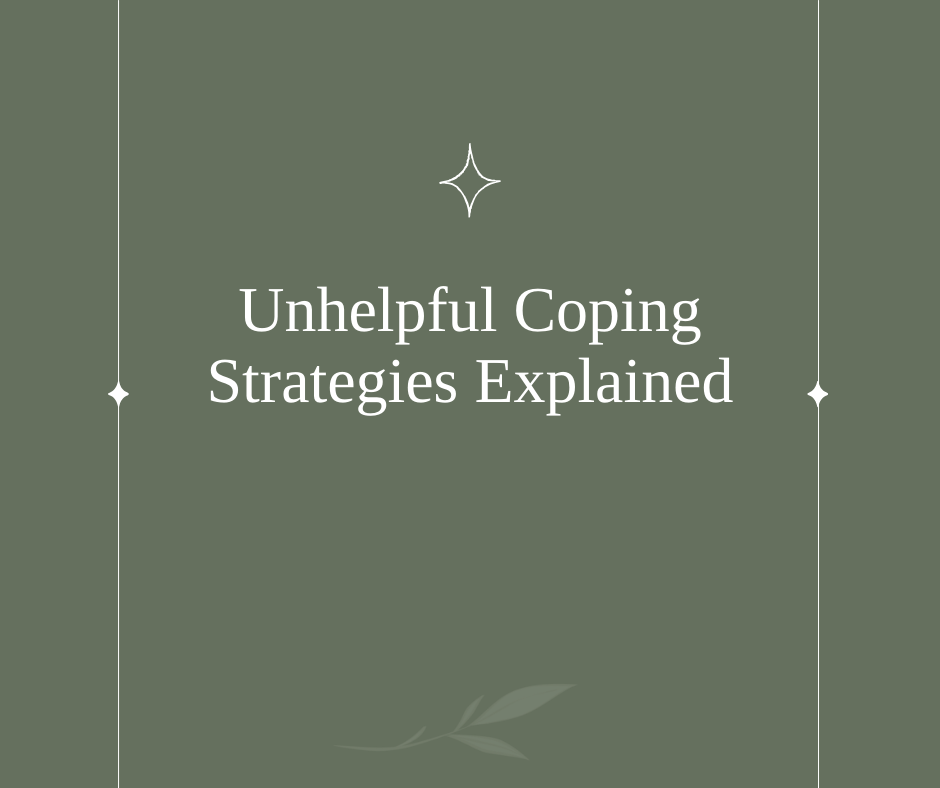What are Unhelpful Coping Strategies?
We are all born with three innate survival strategies – fight, flight, and freeze. These strategies probably developed to protect us from physical danger, but we also use them to deal with psychological threat, including abuse or neglect.
As children, we develop ways of coping with difficult feelings that are not validated, labelled and processed with the help of our caregivers. In Schema Therapy, we call these ‘coping modes’. A ‘fight’ coping mode might be trying to act the opposite of the feeling as a form of fighting it. A ‘flight’ response might be trying to avoid the feeling by distracting yourself or through dissociation. A ‘freeze’ response could look like surrendering to the feeling or to those around you, pushing your own needs and feelings to the side.
Where Do They Come From?
Coping modes may be something you learn through what is modelled to you. For example, if you see a parent constantly running from their feelings or keeping busy all the time to distract themselves, it’s likely you will pick this up. However, sometimes the coping modes are completely automatic. We don’t consciously make a decision to avoid a difficult feeling, it’s just something we automatically do. When we experience a sense of relief as a result, the coping mode is positively reinforced, meaning we are more likely to continue using it.
These coping modes were how you survived in childhood. However, in adulthood, they can prevent you from getting your needs met, keeping you stuck in dysfunctional patterns of thinking, feeling, and behaving. Let’s look at some examples…
People Pleasing
It is said that people pleasers were once parent pleasers, so if this is something you identify with, it may be there’s an element of learnt behaviour. Let’s say as a child you only ever received love and affection from your parents when you helped them. Subconsciously, you will have learnt that when you help people, you receive love which feels nice. So, the more you help them, the more love you will receive… and the vicious cycle begins. Except, in childhood, it’s not a vicious cycle. It’s something that helps you survive. We all need love to feel valued and important.
As a child, people pleasing and ‘being good’ was the means to getting your need for love met by your caregivers. In adulthood, there is no longer a need to people please to survive because you’re in a different environment with different people at a different stage in your life. But what tends to happen is we use the same strategies we used in early life. This can lead to problems.
Imagine you’re at work and your boss asks you to stay late. You might feel panic at the thought of saying no because you’ve got kids to go home to and look after. However, you can’t stand the thought of letting your boss down or potentially making them angry or upset, so you say yes. In other words, you put your needs and desires to the side and prioritise the needs and desires of those around you (in this scenario, your boss).
As a result, you’ll probably feel guilty you’re spending less time with your family. Your children might be unhappy about you being at home less and this can feed into more guilt and pressure. You might also feel angry at yourself because you can’t say no, and this might trigger lots of self-critical thoughts which will understandably make you feel bad.
This is an example of a coping mode that was functional in early life but isn’t anymore and therefore needs to be addressed. We can use therapy to understand and validate its origins and gently learn a new approach. We might practice saying no, putting our needs first and being assertive. It’s not easy, but it can be done. It needs to be worked on slowly and gently because this is an ingrained pattern that has been reinforced since childhood.
Avoiding Difficult Feelings
This coping mode is very common. Not only do I see it a lot in clinical practice, it’s one I can also relate to myself.
It’s very common and normal for children to experience big feelings. In an ideal world, there would be a healthy adult with the child to help them validate the feeling, label it and work through it. We need to feel to heal, so it’s important to learn our emotions are normal, safe and okay to experience. If there is no one who can do this, the child may learn to avoid difficult feelings. Just like people pleasing, when you use this coping mode, you experience emotional relief, positively reinforcing the behaviour and making you more likely to use this strategy in later life.
Avoiding feelings may be beneficial in adulthood for feelings of disturbance, but sometimes we can also cut ourselves off from positive feelings. People who experience depression and feel hopeless about the future might be avoiding all their emotions, not just negative ones. People who avoid difficult emotions are also less likely to heal from trauma because, as I said, we need to feel to heal.
In therapy, we would look at the pros and cons of this strategy. We would help you learn to feel safe with difficult emotions by recreating what should have happened in childhood. Experiencing this repeatedly can help you unlearn old beliefs and behaviours about shutting off from feelings. Over time, you’ll learn that things are different now. It is ok and safe to feel your feelings because emotions are normal and healthy.
Find Out More
Do you relate to either of the examples above? If you need more support to manage your mental health and you’re interested in working with me, you can book a free consultation here. I also share lots of tips and advice via Instagram.
